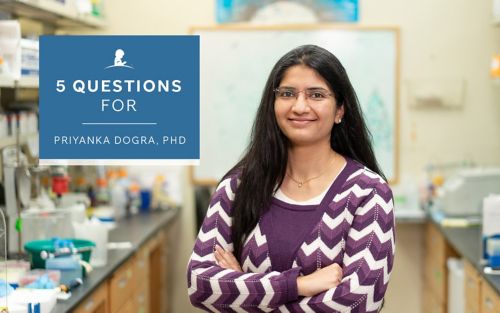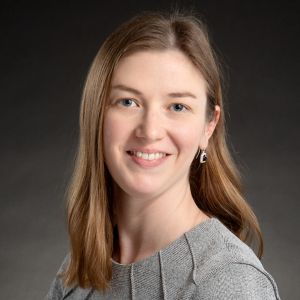St. Jude Family of Websites
Explore our cutting edge research, world-class patient care, career opportunities and more.
St. Jude Children's Research Hospital Home

- Fundraising
St. Jude Family of Websites
Explore our cutting edge research, world-class patient care, career opportunities and more.
St. Jude Children's Research Hospital Home

- Fundraising
5 Questions for Priyanka Dogra, PhD

Priyanka Dogra, PhD, explores the biophysics of phase separation in cancer cells at St. Jude, aiming to uncover new approaches to cancer treatment.
This question-and-answer series explores the motivations, inspirations and accomplishments of investigators at St. Jude. Priyanka Dogra, PhD, is a postdoctoral researcher in the laboratory of Richard Kriwacki, PhD, in the St. Jude Department of Structural Biology. Her research focuses on understanding the biophysical principles that govern phase separation of the nucleolus, a sub-compartment within the nucleus of a cell, and its role in ribosome biogenesis.
1. What do you like most about being a scientist?
Science is a never-ending adventure, filled with challenges, surprises, and moments of awe. What I love most about being a scientist is the incredible privilege of exploring the unknown and experiencing the joy of discovery, knowing that each breakthrough has the potential to transform lives and serve society in meaningful ways.
Each day, there’s this buzz of possibility in the air. Sure, some days are frustrating when hypotheses turn out wrong, or experiments fail, but then there are those magical moments – like when you’re staring at your results, probably on your third coffee, and suddenly everything falls into place. You see a pattern no one has ever noticed, and your heart starts racing because you know this could be something big.
The best part? These discoveries aren’t just personal; we share them with the scientific community through published research articles that help other scientists build upon our work. What excites me to come back every day is knowing that the puzzle piece I’m working on – even if it seems tiny – could be exactly what someone else needs to make a breakthrough that changes lives. This deep-seated love for science drives me to push boundaries, ask questions, and search for innovative solutions. That’s what makes science so special to me – not just the thrill of discovery but the knowledge that our work could make a real difference in someone’s life somewhere down the line.
2. What questions are you trying to answer through your research?
The nucleolus is the protein factory control center of cells. Within this membraneless organelle, the complex process of ribosome biogenesis takes place. Cancer cells are notorious for their increased protein production needs – like factories running at unsustainable speeds. They often hijack nucleolar functions to meet these demands, increasing ribosome production.
In the Kriwacki lab, we study phase separation, the phenomenon by which cells sort and organize biomolecules such as proteins and nucleic acids without a membrane. Nucleolar phase separation plays a role in ribosome biogenesis, so our research focuses on understanding how the nucleolus maintains its complex internal organization through phase separation and how disruptions in this process might contribute to cancers.
Specifically, we are investigating how the biophysical properties of nucleolar proteins and ribosomal RNA govern different steps in ribosome assembly. We want to answer questions such as: how do material properties like surface tension and viscoelasticity impact the efficiency and fidelity of ribosome assembly? As we unravel how cancer cells manipulate their nucleolar organization, we're not just advancing our understanding of cellular biology; we're identifying new ways to fight cancer at its most fundamental level.
3. What resources or capabilities set St. Jude apart as a great place to do research?
St. Jude has a unique combination of cutting-edge research infrastructure and an unwavering commitment to its mission of advancing cures for pediatric diseases. Our state-of-the-art facilities have the latest technological platforms. The advanced research center provides an incredibly collaborative environment that fosters connections between researchers and clinicians.
The institution’s people and culture also make it extraordinary. The open sharing of ideas, data and resources among researchers creates a uniquely collaborative atmosphere. Our ability to work directly with clinicians who treat pediatric cancer patients provides invaluable insights that inform our basic research questions.
Moreover, the commitment of St. Jude to freely sharing research findings and resources with the global scientific community amplifies our impact. When we develop new experimental protocols or make important discoveries, we can immediately share these insights with researchers worldwide, accelerating the pace of discovery in pediatric disease research. Combining these elements – exceptional facilities, collaborative culture and direct connection to patient care – creates an environment where we can pursue ambitious research goals in service of the St. Jude mission.
4. How have mentors at the different stages of your training shaped your career?
Throughout my scientific journey, I’ve been incredibly fortunate to have mentors who shaped my technical expertise and profoundly influenced my approach to science and understanding its impact. During my early training, Dr. Samrat Mukhopadhyay, my PhD supervisor, and Dr. Mily Bhattacharya at the Indian Institute of Science Education and Research in Mohali played a pivotal role in developing my foundation in protein biophysics. Their meticulous approach to experimental design and ability to connect fundamental physical principles to biological questions showed me how rigorous biophysical studies could unlock more profound insights into cellular processes.
Now at St. Jude, Dr. Richard Kriwacki’s mentorship has been invaluable in helping me navigate the intersection of basic biophysical research and nucleolar cancer biology. His vision for applying phase separation principles to understand cancer has opened new avenues in my research. More than that, his commitment to fostering a collaborative research environment and his emphasis on connecting our basic science to translational research has deeply influenced how I approach scientific problems. Each of these mentors has contributed uniquely to my development – from technical expertise and experimental rigor to strategic thinking and translational perspective. My mentors’ trust in me continues to fuel my determination to excel, not just for myself, but to honor the investment they made in my growth.
5. What is one piece of advice you’d give to people considering careers in science?
Follow your scientific curiosity, and don’t be afraid to venture beyond your comfort zone. When I started my journey, I never imagined that my fascination with protein biophysics and phase separation would lead me to cancer research at St. Jude. Places like St. Jude, where basic research directly connects to patient impact, can provide unique opportunities to pursue rigorous science while contributing to a greater purpose. Science is challenging, and there will be many failures along the way. A more profound sense of purpose – whether it's helping patients, advancing human knowledge or solving global challenges – can help sustain you through difficult moments and make the successes even more meaningful.
Remember, a career in science isn't just about knowing facts – it's about persistence, creativity, hard work, motivation and willingness to ask questions that might take years to answer. It's about being comfortable with uncertainty while maintaining the rigor to pursue reliable answers.







